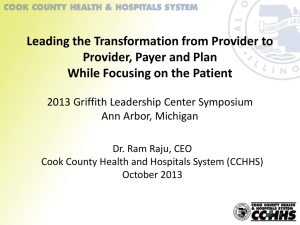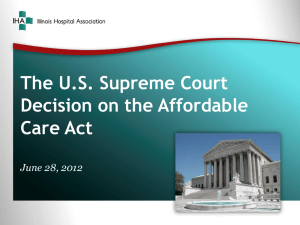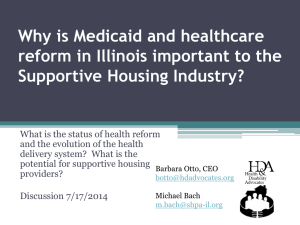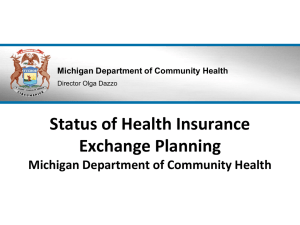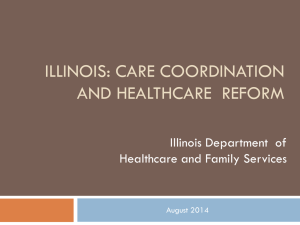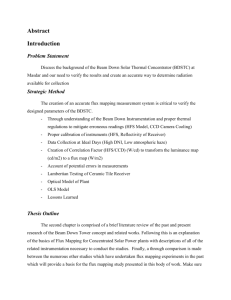Managed Care - EFE
advertisement
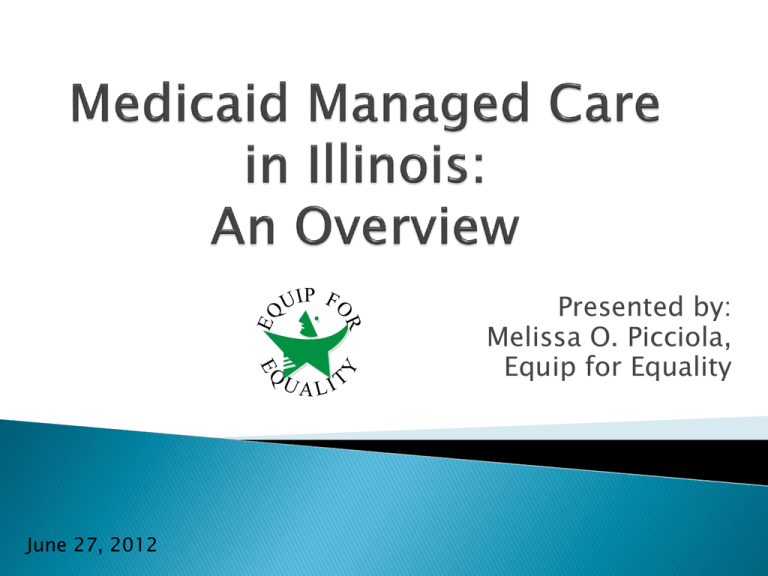
Y EQ R June 27, 2012 O E Q UIP F UALIT Presented by: Melissa O. Picciola, Equip for Equality The concept of managed care in the Medicaid context is no different than in the private insurance market ◦ A.K.A. Coordinated Care, Integrated Care Most states have a Medicaid Managed Care program (all but Alaska, New Hampshire, Wyoming) ◦ 71% of the Medicaid population (and growing) ◦ Until recently, people with disabilities were not widely included in Managed Care programs ◦ Recent Federal support (CMS, ACA) Capitated, Full-Risk ◦ Managed Care Organization (MCO) is paid fixed monthly premium per member and assumes fullrisk for delivery of services (PMPM) Non-Capitated ◦ Providers are paid an additional fee for coordinating care for members Other Models ◦ Partial Risk ◦ Managed Care Community Networks (MCCN) In January 2010, the Illinois Legislature passed a Medicaid Reform Bill. ◦ Requires that 50% of Medicaid clients be enrolled in coordinated care programs by 2015 ◦ Coordinated Care defined broadly to include either capitated, full-risk payment or other risk-based payment arrangements Not just traditional managed care companies, but also new alternative models of care organized and managed by hospitals, Physician groups, Federally Qualified Health Centers (FQHC) or social service organizations ◦ Requires payments to be made based on performance related to health outcomes HFS created Innovations Project to comply The Innovations Project consists of several phases through which the State seeks a redesigned health care delivery system that is more patient-centered with a focus on improved health outcomes, enhanced patient access, and patient safety. To achieve these goals, the State seeks entities to coordinate care across the spectrum of the healthcare system with a particular emphasis on managing transitions between levels of care and coordination between physical and mental health and substance abuse. Integrated Care Program Phase I of the Innovations Project ◦ Coordinated Care Entities & Managed Care Community Networks: statewide Medicaid-Medicare Alignment Initiative Others: ◦ Children? ◦ Voluntary MCOs ◦ Primary Care Case Management Implemented May 2011 for adult Medicaidonly enrollees known as Aged, Blind, Disabled ◦ Adults with disabilities and older adults not enrolled in Medicare Two companies selected: Aetna and IlliniCare Service Package I includes all acute medical and behavioral healthcare Service Package II & III: Includes all long term-care and waiver services ◦ To be implemented Fall 2012 Solicits proposals from Coordinated Care Entities and Managed Care Community Networks to coordinate care for Medicaid individuals ◦ Must include portion of AABD Population ◦ Statewide initiative, not including ICP clients ◦ Voluntary enrollment with 12 month lock-in Will award 10 contracts in Cook County and 10 Contracts outside of Cook County ◦ Received 75 letters of intent in February 2012 ◦ Proposals due June 15, 2012 Provider groups and other organizations: must include PCPs, hospitals, mental health and substance abuse providers ◦ May include others and offer other services outside of care coordination Receives enhanced fee for care coordination ◦ Does not assume full risk Medical services remain Fee-For-Service Proposal must be cost-neutral over 3 years ◦ 3 financial models available: Care Coordination Fee: PMPM fee Shared Savings: Over baseline established by HFS/CMS Other Payment methodology: Proposed by CCE Only for adults already enrolled in Illinois Health Connect ◦ 1.8 million adults as of May 2012 Entity, other than HMO, that is owned, operated, or governed by providers and provides all Medicaid-covered services ◦ May include others and offer other services Full-risk, capitated payment ◦ Assume full-risk for all acute medical and behavioral healthcare May include dental and pharmacy May include long-term care and waiver services Enrollees do not have to be enrolled in Illinois Health Connect, but may be HFS has filed proposed rules amending the financial requirements for a MCCN ◦ Essentially lowering financial thresholds and allowing HFS to limit enrollment Up to 5 (at least 2), risk-based contracts awarded to HMOs and MCCNs to provide all Medicare and Medicaid Covered Services to dual-eligibles ◦ Individuals with Developmental Disabilities that receive services in an institutional setting or through a HCBS waiver are excluded ◦ Excludes those already enrolled in CCE or MCCN ◦ Full-risk, capitated payment Implementation by January 2013 Greater Chicago and Central Illinois ◦ 2 separate solicitations Enrollment is Passive, but voluntary ◦ No lock-in period; i.e. can disenroll at any time Studies have shown that managed care models have had positive impact on access and continuity of care while reducing overall medical costs ◦ Avoid unnecessary medical services ◦ Provide coordination and integration of services Decrease “silos” Pay for Performance Measures and Bonus Payments for achieving certain outcomes ◦ Encourages providers to be accountable and allows states to set benchmarks Incentive to care for the whole individual ◦ Focus on overall health and prevention Prompt Provider Payment! ◦ More predictable costs for Illinois Encourage use of home and communitybased alternatives to institutional care Providing individualized case management services and disease management services ◦ For some individuals, for the first time in their lives Little to no evidence and no model regarding managed care for people with disabilities ◦ Particularly those with developmental disabilities and others who require long-term care Medical Model v. Person-Centered Model ◦ Treated as a diagnosis and not as a person ◦ Care is already coordinated by the individual ◦ Loss of consumer control Problems with access and disruptions of care ◦ Especially in early stages of program ◦ ICP experienced problems with hospital network ◦ Access to specialists may be restricted Prior Authorization and Utilization Review translate into restricting benefits ◦ Cost savings are realized through restriction of services Increased bureaucracy at every stage ◦ State shifts responsibility for program How will long-term care services be integrated? ◦ Personal Assistant services and SEIU contract ◦ Will those living in institutions really be given a choice? How does this affect Illinois’ stated commitment to rebalancing? ◦ Will causing MCOs to contract with institutional providers create a conflict of interest that will prevent rebalancing? How does managed care interact with Williams, Ligas, and Colbert? ◦ HFS has so far been vague but offered assurances that individuals will not be denied any services to which they are entitled. How will recent changes to the Medicaid program affect the ICP and subsequent programs? ◦ Additional restrictions on benefits ◦ Prior Approval Process Continue to be diligent and educated advocates ◦ Stay informed and know what changes will affect individuals ◦ Be ready to pursue grievance and appeals when services are denied or restricted ◦ Become involved in consumer advisory councils and know who to call with questions and concerns CMS Innovations Dual Eligible Demonstrations ◦ http://www.innovations.cms.gov/initiatives/StateDemonstrations/index.html HFS Care Coordination Innovations Project ◦ http://www2.illinois.gov/hfs/PublicInvolvement/cc/ Pages/default.aspx
